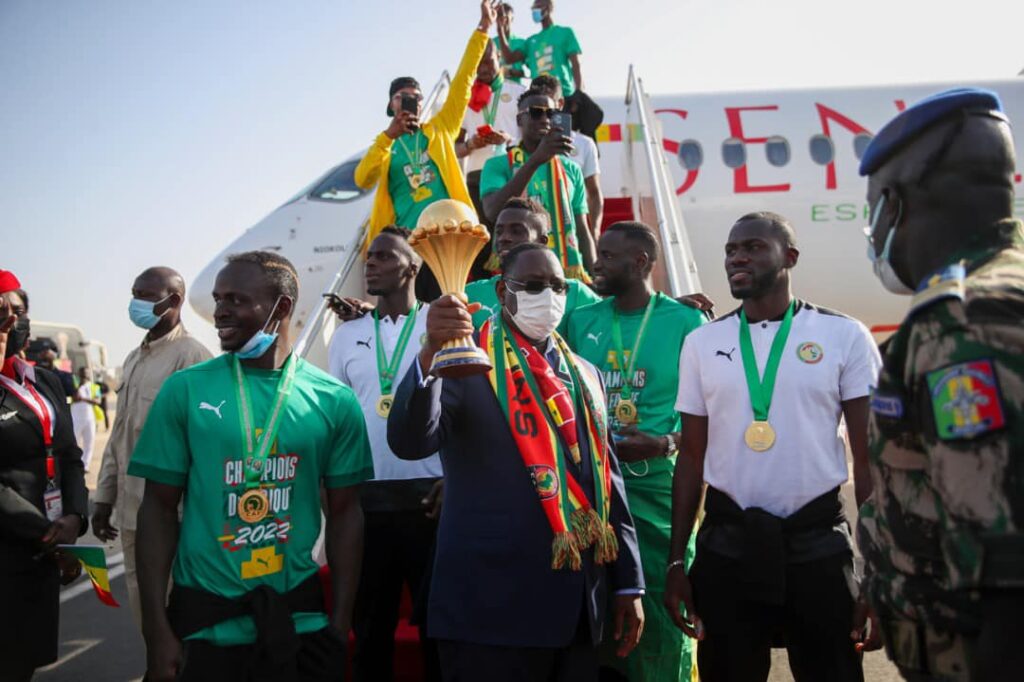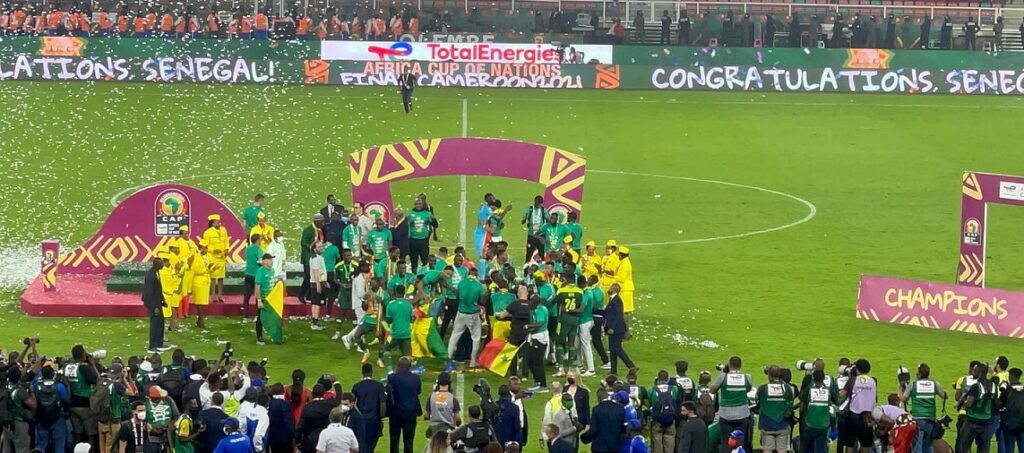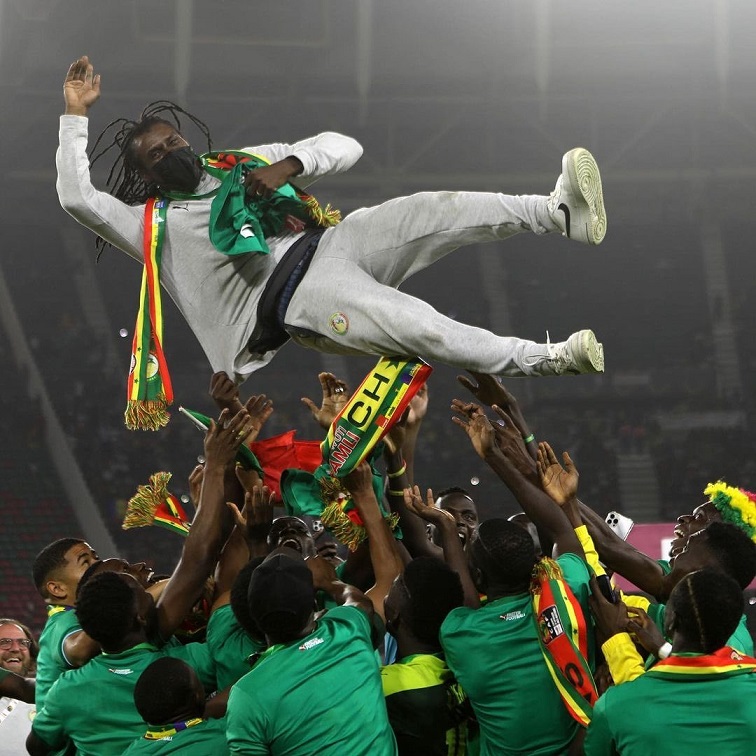Africa’s footballing showpiece took place in Cameroon from 9 January to 6 February 2022.
Despite a delay to the tournament originally billed to take place in 2021, there was no denying African football lovers the traditional frills and thrills of the world’s oldest continental football tournament. Contributing Editor, Michael Nnaji, reports.
——-
The 33rd edition of the African Cup of Nations (AFCON) reached its climax on Sunday, 6 February, with Senegal taking on 7-time champions, Egypt at the Olembe Stadium in Yaoundé, Cameroon.
The tournament which had been initially scheduled to take place in January 2021 was twice shelved, first from January and February and then to June and July 2021, due to the COVID pandemic and “unfavourable” climatic conditions respectively.
The build-up to the event was riddled with controversy, with many Eurocentric football “experts” questioning the wisdom of staging an international tournament in the middle of the European season, with players being asked if they intended to honour the call to national duty. This criticism was met with equal flak from African football players, coaches and aficionados, who sensed a lack of respect for the African Game.
Played this year across the five Cameroonian cities of Doula, Limbe, Garoua, Bafoussam and Yaoundé, African football enthusiasts were treated to a 3-week football fiesta featuring some of the continent’s best footballers.

The expansion of the number of teams from 16 to 24 by the Confederation of African Football (CAF) since 2019 meant more fans across the continent got to see and savour their teams in action. In the new format the two top teams from each of the 6 groups qualify automatically and are joined in the round of 16 by the 4 best placed third placed teams of the group stage.
Minnows Show Their Mettle
As the Guardian’s Jonathan Wilson has noted, one of the gains seen in World and African football in recent years has been the rise of hitherto “smaller” teams, now capable of holding their own against the more established footballing nations. AFCON 2021 was no exception, as it witnessed several shock results.
In this regard, Burkina Faso deserve an honourable mention, with the Stallions motoring all the way to the semifinal, but eventually losing to hosts Cameroon on penalties after leading 3-0 in the game for third place. Malawi and the Comoros (with a population of 870,000) and Cape Verde (population 556,000) even made it to the knockout stages, albeit as third best placed teams ahead of the likes of Ghana and Zimbabwe. Cape Verde and Comoros were joined by Malawi, Equatorial Guinea (both surprise teams) and Tunisia in the round of 16. Equatorial Guinea caught the eye, with its Football Federation scouring the lower leagues of French League for players eligible to play for the country, which evoked memories of Cameroon’s journeymen from the same lower tiers of French football in 1990 who reached the quarterfinals of that year’s World Cup held in Italy.
“Giants” Swept Aside
The Black Stars of Ghana, 4-time winners of the tournament were probably the biggest disappointment, bringing up the rear in group C. Their Serbian coach, Milovan Rajevac, paid the ultimate price by being relieved of his job days after their elimination. The Black Stars will now hope to regroup ahead of their World Cup Qualifying play-off with Nigeria in March. Meanwhile the wait for a fifth AFCON title since 1982 continues.
The Super Eagles of Nigeria, after winning all their group games, were favourites to win the trophy; but they ultimately flattered to deceive, limply losing 1-0 to injury- and COVID-ravaged Carthage Eagles of Tunisia. Hopes of a fourth AFCON title were undermined by Nigerian Football Federation (NFF) sacking their Franco-German coach, Gernot Rohr, some 4 weeks to the tournament. The interim coach, Augustine Eguavoen – who is set to be replaced by the Portuguese, Jose Peseiro – ultimately failed to galvanize a group of talented footballers to their first title since 2013.

Defending Champions Algeria were also a huge disappointment, and like Ghana, also failed to make it out of their group finishing bottom of their group. The physicality, tactical astuteness and hunger that saw them win their second AFCON title in 2019, were all missing. They will now look with trepidation to a two-legged World Cup qualifier against the Indomitable Lions of Cameroon.
The tournament was marred by the death of six football fans in a stampede at the Olembe Stadium, Yaoundé. Chaos reportedly broke out when some ticketless fans forcibly tried to gain access into the stadium. The stadium was banned from hosting further matches due to security concerns. However, this decision was rescinded after security was tightened and the stadium capacity was drastically reduced.
Not surprisingly, CAF played Pontius Pilate and sought to shift the blame to the Local Organizing Committee, even though its technical committee had passed the stadium fit to host the tournament.
Meanwhile, the Paul Biya-led Cameroon government passed the buck to ‘unruly’ fan behaviour at a stadium ironically named after the country’s president. Subsequent reports showed that parts of the stadium had not been completed despite work having commenced months ago.
Quarterfinal & Semifinal Encounters
Other teams that joined Burkina Faso, Equatorial Guinea, Gambia, Tunisia and Morocco in the quarterfinal stages include Senegal, Senegal hosts Cameroon. Whereas Burkina Faso surprisingly ousted Tunisia in a tense encounter, Senegal ended a dream tournament for the Thunders of Equatorial Guinea, winning 3-1, thanks to their inspirational forward, Sadio Mane.
Cameroon comfortably dispatched Gambia 2-0 to set up a classic with The Pharaohs of Egypt who beat fellow North Africans, Morocco, 2-1 in tension-soaked and dramatic encounter.
In an eagerly awaited semifinal clash, hosts Cameroon, after a bright start, appeared to wilt under the pressure of expectation while succumbing to a well drilled and streetwise Egyptian team led by their inspirational skipper, Mohammed Salah. The Pharaohs would eventually triumph 3-0 in a penalty shootout after an eventful 0-0 draw, featuring two teams who have won 12 AFCON titles between them. Senegal, on the other hand, underlined their title credentials by beating Burkina Faso in the other semifinal in game Mane shone once again.
A Final With Several Narratives
There were several strands of narratives leading up to the final that featured Senegal against Egypt. While Senegal were hoping to win their first AFCON, following final losses to Cameroon (2002 in Mali) and Algeria in 2019 (held in Egypt), the Pharaohs were looking to extend their title-winning record having won the tournament seven times.
Beyond that, the Pharaohs were the only North African team to have won the tournament in Sub-Saharan Africa (1998 in Burkina Faso and 2010 in Angola). Moreover, they were looking to assuage their fans after a disappointing home tournament at the last edition where they were bundled out in the round of 16. In addition, the AFCON showpiece also featured two of Africa’s all-time greatest players in Mane and Salah, who, interestingly play for the English Premier League side, Liverpool.

At any rate, a global audience was treated to a feisty football game which was beautiful in patches, but ultimately a hard watch. As an unsavoury backdrop to the final, Egypt’s Portuguese coach Carlos Queiroz, along with his assistant, was suspended for the final after having been cautioned by the referee for dissent in the semifinal against Cameroon.
Senegal, with ostensibly the better individual players, started adventurously, earning a penalty in the fourth minute when Egyptian defender Mohamed Abdel fouled the Senegalese forward Famara Diedhiou in the area. The resulting penalty kick was saved by the Egyptian goalkeeper, Mohamed Abougaba Gabaski, who was standing in for the injured first choice goalie.
The penalty miss set the stage for a lively encounter which saw the Terenga Lions of Senegal on the front foot and Egypt content to soak up the pressure and hitting their opponents on the break. While Mane continued to remain lively despite the spot kick miss, Salah was kept quiet by the Senegalese defense marshalled by the irrepressible Kalidou Koulibaly.
Salah was swarmed each time he had a sniff of the ball by a blur of Senegalese green shirts. He managed to escape their attention twice though, once scoffing a shot that the Lions’ goalkeeper, Eduard Mendy, dealt with with ease in the 29th minute and in the 43rd minute, scotching Mendy’s palms with a shot to the near post after cutting inside the right channel onto his favoured left foot after leaving 4 Senegalese defenders for dead. Senegal’s best chances came from the right flank, where Ismaila Sarr worked the channels and produced some dangerous crosses which Mane failed to meet twice.
The second half was a slow burner, flickering briefly into life 7 minutes after the break when pandemonium broke out in the Egyptian 6-yard box following another cross from the right wing, but Senegal failed to capitalize.
Senegal initially dominated possession, but Egypt gradually gained a foothold in the game and frustrated the Lions with some gritty defending. The match eventually petered out, Egypt probably the more content team and surer of their chances, having thrice played extra time in the previous 3 knockout games. The extra time failed to produce a winner, chances falling to both sides with both goalkeepers doing well to keep a clean sheet.
In the end it came down to a dramatic penalty shootout in which Senegal won 4-2 with Mane scoring the decisive kick. Against the backdrop of his earlier penalty miss, the Liverpool forward showed great composure and cojones to bury his effort beyond the otherwise excellent Gabaski. Salah, who was apparently billed to take Egypt’s last penalty, was reduced to tears at the final whistle.
At the end, it was ultimately a triumph for African coaches, with Aliou Cisse, joining the select group of indigenous coaches to have won the AFCON. It was a sweet triumph for him after he missed the decisive spot kick in a similar shootout in the 2002 AFCON against Cameroon, exorcizing in the process some demons. It was the winners most neutrals wanted, based on the balance of play and Senegal’s exciting brand of play.
Tactical Evolution
Purists have bemoaned the lack of quality in some of the games seen at the year’s AFCON. This was however driven, not by lack of quality on the part of the players, but mostly by the fear of losing – considering the stakes. Matters were not helped by the poor playing surface at some of the stadia.
Despite this safety-first approach, there were discernible tactical sophistication. This would come as no surprise since most of the players ply their trade in Europe (Egypt being a notable exception with the bulk of the squad drawn from the local league) and were either being managed by Europeans or local coaches who did their coaching badges in Europe.
All the components that are wont to be associated with modern progressive football, to wit, high pressing and counter-pressing, playing out from the back, good use of width and playing high up the pitch were all in evidence, encapsulated by games involving the likes of Cameroon, Nigeria and Senegal, to name a few. If this newfound tactical awareness is allied with good game management, judicious applications of sports science and administrative competence (a bane of African football), then there is no reason why African teams will not fare well in the 2022 World Cup scheduled to be staged in Qatar later this year.
The following awards were given at the conclusion of the tournament:
Team of the Tournament – Senegal (Champions)
Player of the Tournament – Sadio Mane (Senegal)
Golden Boot Winner – Vincent Aboubakar (Cameroon) with 8 goals.
Goalkeeper of the tournament – Eduard Mendy (Senegal)
 THE AFRICAN COURIER. Reporting Africa and its Diaspora! The African Courier is an international magazine published in Germany to report on Africa and the Diaspora African experience. The first issue of the bimonthly magazine appeared on the newsstands on 15 February 1998. The African Courier is a communication forum for European-African political, economic and cultural exchanges, and a voice for Africa in Europe.
THE AFRICAN COURIER. Reporting Africa and its Diaspora! The African Courier is an international magazine published in Germany to report on Africa and the Diaspora African experience. The first issue of the bimonthly magazine appeared on the newsstands on 15 February 1998. The African Courier is a communication forum for European-African political, economic and cultural exchanges, and a voice for Africa in Europe.



